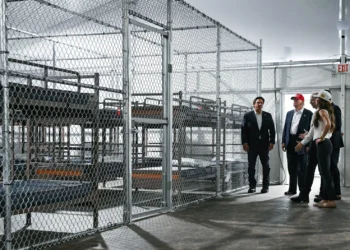A widespread power outage has struck Spain and Portugal, causing significant disruptions across both countries and extending into parts of France.

The outage has resulted in chaos on roads and in airports due to the loss of traffic lights and other critical infrastructure. Authorities in the affected regions have declared a state of emergency as they work to restore electricity.
Efforts to bring substations back online are underway, with Spain’s power almost fully restored and Portugal working to resolve the issue. The cause of the massive blackout remains unknown.
Key Takeaways
- Widespread power outage affects Spain, Portugal, and parts of France.
- Significant disruptions reported on roads and in airports.
- A state of emergency declared in the affected regions.
- Authorities working to restore electricity and identify the cause.
- Spain’s power is almost fully restored, with Portugal’s substations being brought back online.
The Blackout Event: What Happened
The blackout event that occurred brought widespread disruption to Spain, Portugal, and parts of France. This significant electricity disruption affected millions, causing widespread inconvenience and concern.
Timeline of the Power Outage
The power outage began at approximately 10:33 GMT and escalated rapidly across the affected regions.
Initial Reports and Escalation
Initial reports indicated a sudden loss of power in major cities, including Madrid. The outage took out lighting and power sockets, and caused subway systems to suddenly fail.
Duration of Outages by Region
The duration of the outages varied by region, with some areas experiencing power losses for several hours. Key statistics include:
- Madrid: 4 hours without power
- Lisbon: 3.5 hours without power
- Affected areas in France: 2-5 hours without power
Geographic Scope of the Disruption
The blackout affected a wide geographic area, impacting major cities and towns across Spain, Portugal, and parts of France.
Most Affected Areas
The most affected areas included major metropolitan regions, where the loss of power had significant impacts on daily life and essential services.
Cross-Border Impact Assessment
The cross-border impact was significant, with the disruption affecting not only local communities but also highlighting the interconnectedness of the European power grid.
In Madrid, traffic piled up on the roads after the lights went out, and emergency services were quickly overwhelmed with calls. The widespread nature of the blackout underscored the vulnerability of modern infrastructure to such disruptions.
Current Status: Recovery Efforts Underway
Recovery efforts are underway after a widespread grid failure hit the Iberian Peninsula and parts of France. By the end of Monday, grid operators reported that the supply of energy was gradually being restored in pockets of both countries.
Spain’s Power Restoration Progress
More than 87% of power had been restored in Spain by early Tuesday morning. The restoration efforts have been focused on Priority Restoration Zones, which include major cities and critical infrastructure.
Priority Restoration Zones
These zones were identified based on the urgency of the need for power restoration, with areas having essential services being given top priority.
Remaining Affected Areas
Despite the progress, some areas remain without power. Efforts are continuing to restore energy to these regions.
Portugal’s Substation Recovery
In Portugal, substations are being brought back online as part of the recovery efforts. However, technical challenges have been faced, including equipment damage and the need for specialized repairs.
Technical Challenges Faced
The technical challenges include damaged equipment and the complexity of repairs required for the substations.
Restoration Timeline
A detailed restoration timeline is being worked on, with the aim of completing the process as soon as possible.
Situation in Affected French Regions
The affected regions in France are also seeing efforts to restore power, with a focus on cross-border coordination to ensure a unified approach to grid management.

| Country | Restoration Progress | Remaining Challenges |
|---|---|---|
| Spain | 87% restored | Remaining areas without power |
| Portugal | Substations being restored | Technical challenges and equipment damage |
| France | Ongoing restoration efforts | Cross-border coordination |
State of Emergency in Spain: What It Means
Following the extensive power outage, a state of emergency was declared across various Spanish regions. This measure was taken to ensure public safety and facilitate the restoration of essential services.
Emergency Measures Implemented
The declaration of a state of emergency grants the government additional powers to manage the crisis effectively. Emergency services have been heightened, with personnel working around the clock to restore power and maintain order.
Resource Allocation and Emergency Powers
Resources are being allocated efficiently to address the power outage’s impact. The government has been granted emergency powers to expedite decision-making and response efforts.
Duration and Scope of Emergency Status
The state of emergency has been declared in the regions of Andalucia, Extremadura, Murcia, La Rioja, and Madrid. The duration of this status will depend on the progress of recovery efforts.
Legal Framework and Precedents
The legal framework for declaring a state of emergency is well-established in Spain. Previous instances have set precedents for the current response, guiding the government’s actions.
Immediate Impact on Daily Life and Essential Services
The massive power outage that hit Spain, Portugal, and parts of France brought daily life to a grinding halt. The widespread disruption affected various aspects of society, from transportation and healthcare to water and communication systems.
Transportation Disruptions
The power outage had a significant impact on transportation networks across the affected regions. Train services in both Spain and Portugal came to a standstill, causing widespread inconvenience.
Rail and Air Traffic Complications
Video footage aired on Spanish television showed people evacuating metro stations in Madrid, while empty stations with stopped trains were seen in Barcelona. Air traffic was also affected, with several flights delayed or canceled due to the outage.
Urban Transit Systems
Urban transit systems, including metro lines and buses, were severely disrupted. In Madrid, for instance, metro services were halted, leaving commuters stranded. The situation was chaotic, with many people forced to walk or find alternative modes of transportation.

Healthcare Facilities and Emergency Services
Healthcare facilities and emergency services were also impacted by the power outage. Hospitals had to switch to backup power systems to maintain critical care services.
Hospital Backup Systems Performance
Fortunately, hospital backup systems performed well, ensuring that medical care continued with minimal disruption. This was crucial in maintaining the safety and well-being of patients.
“The backup power systems in our hospitals worked effectively, allowing us to continue providing medical care without major interruptions.”
Water and Communication Systems
The power outage also affected water and communication systems. While some areas experienced water supply disruptions, others managed to maintain service.
Cellular Network Resilience
Cellular networks showed resilience during the outage, with many providers maintaining service through backup power systems. This allowed people to stay connected and receive critical updates.
| Service | Impact | Backup Systems |
|---|---|---|
| Transportation | Significant disruptions | Limited |
| Healthcare | Minimal disruption | Effective backup power |
| Water Supply | Variable impact | Partial backup |
| Cellular Networks | Minimal disruption | Effective backup power |
Massive Power Outage Across Spain, Portugal, and Parts of France: Economic Consequences
The sudden and unexplained power outage across major cities in Spain, Portugal, and France has sent shockwaves through the regional economy. The blackout, which hit a huge and busy swathe of southern Europe, affected dozens of Iberian cities, including Madrid, Lisbon, Barcelona, Seville, and Valencia, which are major hubs for transport, finance, and tourism.

Business Interruptions and Financial Losses
The immediate effect of the blackout was the interruption of business operations across various sectors. Companies, especially those in the financial and technological industries, faced significant disruptions.
Industry-Specific Impacts
Industries reliant on continuous power supply, such as data centers and manufacturing facilities, were particularly affected. For instance, manufacturing plants had to halt production, leading to potential losses in productivity and revenue.
- Data centers experienced downtime, affecting cloud services and data access.
- Manufacturing plants halted production, impacting supply chains.
- Financial institutions faced challenges in processing transactions.
Insurance and Compensation Questions
The blackout has raised questions about insurance coverage and compensation for businesses affected by the outage. Companies are likely to file claims for losses incurred during the blackout.
Impact on Tourism and Hospitality
The tourism industry, a significant contributor to the economies of Spain and Portugal, suffered due to the blackout. Tourist attractions and hospitality services were disrupted, potentially impacting the region’s reputation as a reliable tourist destination.
Key areas affected include:
- Disruption of services in hotels and resorts.
- Cancellation of events and conferences.
- Impact on tourist attractions and historical sites.
Long-term Economic Implications
The long-term economic implications of the blackout are a concern for regional authorities. The incident highlights the need for grid resilience and infrastructure upgrades.
Recovery Cost Estimates
Estimating the recovery costs, experts consider factors such as infrastructure repair, business interruption losses, and potential investments in grid modernization.
The total cost of the blackout is likely to be substantial, with some estimates suggesting it could run into billions of euros.
Investigating the Cause: What We Know So Far
In the aftermath of the power outage, a thorough investigation is underway to determine the root cause of the grid failure. Officials are working closely with energy experts to analyze the events leading up to the blackout.
Official Statements on Potential Causes
Spain’s Prime Minister Pedro Sánchez stated that a problem in the European grid, described as a “strong oscillation,” was behind the outage. Portugal’s Prime Minister Luís Montenegro echoed this, noting there was “no indication” of a cyber attack. These statements provide initial insights into the potential causes of the disruption.
“We are investigating the cause of the power outage, and preliminary findings suggest a technical issue within the grid.”
Technical Explanations from Energy Experts
Energy experts are examining two primary scenarios: grid failure and the cascading effect.
Grid Failure Scenarios
A grid failure occurs when there’s a significant imbalance between electricity supply and demand, or when there’s a fault in the transmission infrastructure. Experts are investigating whether such a failure triggered the blackout.
Cascading Effect Analysis
The cascading effect refers to a situation where a failure in one part of the grid triggers failures in other parts, potentially leading to a widespread outage. Investigators are analyzing whether this effect played a role in the recent blackout.

Ruling Out Cyber Attacks
Both Spanish and Portuguese leaders have indicated that cyber attacks are unlikely to be the cause. This assessment is based on initial security assessments and investigations.
Security Assessments and Investigations
Security experts are conducting thorough assessments to confirm the absence of cyber threats. These investigations involve analyzing grid security measures and monitoring for any suspicious activity.
The investigation into the cause of the power outage is ongoing, with officials and experts working together to identify the root cause and implement measures to prevent future occurrences.
Government Responses and Political Reactions
A significant power outage has prompted immediate reactions from the governments of Spain, Portugal, and parts of France. The swift response underscores the severity of the situation and the need for coordinated efforts to address the crisis.
Spain’s Prime Minister Pedro Sánchez’s Response
Spain’s Prime Minister, Pedro Sánchez, has been at the forefront of addressing the power outage. He warned against speculation regarding the cause of the blackout, emphasizing the need for a thorough investigation.
Warning Against Speculation
Prime Minister Sánchez cautioned against jumping to conclusions about the outage’s cause, highlighting the complexity of the issue and the necessity for a detailed analysis.
Portugal’s Prime Minister Luís Montenegro’s Statements
Portugal’s Prime Minister, Luís Montenegro, has been in close communication with his Spanish counterpart. He expressed confidence that power would be restored by the end of the day, following discussions with Prime Minister Sánchez.
Addressing Cyber Attack Concerns
Prime Minister Montenegro addressed concerns about potential cyber attacks, stating that while such threats are always a consideration, there was currently no evidence to support this as the cause of the outage.
French Government’s Position
The French government has also been actively monitoring the situation, with officials working closely with their Spanish and Portuguese counterparts to understand the cause and facilitate recovery efforts.
EU-Level Response and Support
The European Union has offered support to the affected countries, with EU officials coordinating with national governments to provide assistance where needed. This collaborative approach aims to mitigate the impact of the power outage and expedite the restoration of services.

Historical Context: Previous Major Power Outages in Europe
Europe has experienced its fair share of significant power outages in recent years, providing valuable lessons for the current situation. The recent blackout affecting Spain, Portugal, and parts of France is the second serious European power outage in less than six weeks, following a March 20 fire that shut down Heathrow Airport in the U.K.
Notable Blackouts and Their Causes
Several major power outages have occurred in Western Europe, highlighting vulnerabilities in the grid. One significant event was the 2006 European blackout, which affected several countries.
The 2006 European Blackout
The 2006 European blackout was caused by the shutdown of a power line over the Ems River in Germany, which led to a cascade failure affecting millions of people across Europe. This incident highlighted the interconnectedness and vulnerabilities of the European power grid.
Recent Regional Incidents
In addition to the 2006 blackout, there have been several recent regional incidents. For instance, a fire at a substation in Portugal caused a significant outage in 2022. These incidents demonstrate the ongoing challenges faced by Western Europe’s electricity infrastructure.

Comparative Analysis with Current Situation
The current power outage shares some similarities with past incidents, such as the widespread disruption of essential services. However, the cause of the current outage remains unknown, making it difficult to draw direct comparisons.
Lessons Previously Learned and Applied
Previous power outages have taught valuable lessons about grid resilience and the importance of cross-border cooperation. “The European power grid’s complexity requires a coordinated response to prevent and mitigate future disruptions,” said an energy expert. These lessons are being applied to improve the grid’s robustness and response to future incidents.
The Iberian Peninsula’s Power Grid: Vulnerabilities Exposed
The Iberian Peninsula’s power grid was severely tested by a recent massive blackout, uncovering underlying issues in its infrastructure. The widespread disruption caused by the power outage highlighted the region’s vulnerability to grid failures.

Infrastructure Assessment
The age and condition of critical components within the power grid played a significant role in the outage. Many of the grid’s components are nearing the end of their operational lifespan, making them more susceptible to failure.
Age and Condition of Critical Components
A detailed assessment revealed that several key substations and transmission lines were operating beyond their recommended service life. This not only increases the likelihood of equipment failure but also complicates maintenance and upgrade efforts.
Cross-Border Power Dependencies
The Iberian Peninsula’s power grid is interconnected with neighboring countries, creating dependencies that can exacerbate the impact of a failure. The recent outage demonstrated how a disruption in one part of the grid can quickly propagate across borders.
Interconnection with European Grid Networks
The integration of the Iberian Peninsula’s power grid with the broader European grid allows for the sharing of power resources. However, this interconnection also introduces complexities that can affect grid stability.
Resilience of International Power Sharing
The ability of the grid to withstand and recover from disruptions is crucial. Enhancing the resilience of international power sharing mechanisms is essential for minimizing the impact of future outages.
Renewable Energy Integration Challenges
The incorporation of renewable energy sources into the grid, while beneficial for sustainability, presents technical challenges. The variability of renewable energy output can strain grid stability, particularly during periods of high demand or when other parts of the grid are under stress.
The recent power outage serves as a critical reminder of the need to address these vulnerabilities. By upgrading infrastructure, enhancing cross-border cooperation, and improving the integration of renewable energy sources, the Iberian Peninsula can strengthen its power grid against future disruptions.
Conclusion: Lessons Learned and Future Preparedness
As power is almost fully restored in Spain and substations in Portugal are being brought back online, the massive power outage that affected Spain, Portugal, and parts of France serves as a significant reminder of the importance of grid resilience.
The experience has highlighted the need for continued investment in infrastructure and emergency planning to prevent or mitigate the impact of similar events in the future.
Key lessons learned from this event include the importance of cross-border cooperation and the need for robust emergency preparedness measures.
Moving forward, the energy sector in Spain, Portugal, and France is likely to undergo significant improvements in grid resilience, ensuring a more reliable supply of electricity to meet the needs of citizens and businesses.
By learning from this experience, these countries can enhance their ability to respond to and manage future disruptions, ultimately strengthening their energy infrastructure.
FAQ
What caused the massive power outage in Spain, Portugal, and parts of France?
The exact cause of the power outage is still under investigation, but officials have not ruled out a grid failure as a potential reason.
How long did the power outage last in the affected areas?
The duration of the power outage varied across different regions, with some areas experiencing a longer disruption than others. Restoration efforts are still underway.
Were there any disruptions to essential services like healthcare and transportation?
Yes, the power outage had a significant impact on daily life and essential services, including transportation disruptions, healthcare facilities, and water and communication systems.
What was the economic impact of the power outage on businesses and tourism?
The power outage resulted in significant business interruptions and financial losses, particularly in the tourism and hospitality sectors, with long-term economic implications still being assessed.
Was the power outage a result of a cyber attack?
Officials have ruled out cyber attacks as a potential cause of the power outage, with investigations focusing on technical explanations and grid failure scenarios.
How did the governments of Spain, Portugal, and France respond to the power outage?
The governments of the affected countries responded promptly, with Spain’s Prime Minister Pedro Sánchez, Portugal’s Prime Minister Luís Montenegro, and the French Government issuing statements and providing support. The EU also provided support at the EU level.
What measures were taken to restore power in the affected areas?
Restoration efforts included Spain’s power restoration progress, Portugal’s substation recovery, and the situation in affected French regions, with technical teams working to address the technical challenges faced.
What is being done to prevent similar power outages in the future?
The incident has highlighted the need for grid resilience and continued investment in infrastructure and emergency planning, with efforts underway to enhance future preparedness and address the vulnerabilities exposed by the power outage.
How does this power outage compare to previous major power outages in Europe?
The current situation is being compared to past incidents, with lessons learned from previous experiences being applied to the current response and future preparedness efforts.
What are the challenges of integrating renewable energy into the power grid?
The power outage has highlighted the challenges of renewable energy integration, including the need for infrastructure assessment, cross-border power dependencies, and interconnection with European grid networks.
What is the current status of the power grid in the Iberian Peninsula?
The power grid in the Iberian Peninsula is still recovering from the outage, with ongoing efforts to restore power and address the vulnerabilities exposed by the incident, including infrastructure assessment and cross-border power dependencies.
How did the state of emergency declared in Spain affect the response to the power outage?
The state of emergency declared in Spain enabled the implementation of emergency measures, which facilitated the response to the power outage and the restoration efforts.





















































